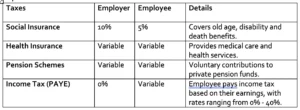Navigating the complex labour laws governing employment practices is essential when running Uganda payroll. However, building an in-house compliance team may not be the most efficient way to manage your remote team’s payroll in Uganda.
Regardless of size, global companies need help to secure in-country expertise for localised payroll service. This is where a partner like Workforce Africa provides significant value in supporting global firms to maintain compliance when handling payroll in Uganda, addressing every intricate detail, including;
- Salary computation requirements,
- Taxation legislation specifics (social security, employee income tax, corporate tax, VAT and other employee deductions,
- Benefits administration, and more (health insurance, pension, paid leaves, holiday compensation.
Workforce Africa simplifies hiring and payroll compliance for offshore talent management in Uganda. No need for a subsidiary or entity setup. From contracts and onboarding to taxes, payroll, and admin tasks, partnering with us – a payroll firm in Uganda will help you focus on growth for greater levels of success.
Employment Contract Termination
In accordance with the laws of Uganda, employment contracts can be terminated by either party upon giving notice depending on the terms of the contract. The employer may also terminate an employee’s contract without notice if there is just cause, such as gross misconduct or breach of contract. Conversely, an employee may terminate their contract by resigning in writing, which must be acknowledged by the employer. It is essential to follow the proper procedures for terminating an employment contract to avoid any potential legal disputes or penalties.
Uganda Country Overview
The Republic of Uganda lies in East Africa. It is predominantly an English-speaking country. Two major cities in Uganda are Kampala, the capital, political and economic hub, and Gulu. These urban centres act as transit points to ecotourism destinations and beach resorts. With a population exceeding 49.9 million people, Uganda boasts a significant demographic presence.
In recent years, key industries experiencing growth include mining, oil and gas, and agricultural products. Uganda also boasts a market-based, diversified economy comprising petroleum imports, tourism, and services. Considerations such as the low labour cost and abundant natural resources make Uganda attractive for businesses seeking expansion opportunities.
Although Uganda possesses a highly skilled workforce, hiring and establishing a team can be time-consuming and challenging. However, partnering with an Employer of Record (EOR) or Professional Employer Organisation (PEO) in Uganda facilitates swift market entry. It manages all legal complexities associated with operations in the country. It manages all legal complexities associated with operations in the country.
Payroll Processing in Uganda
Local labour laws in Uganda govern payroll processing, with each employee’s salary potentially calculated differently. Due to compliance concerns, processing payroll at scale can become complex, cumbersome, and risky. Here are the phases of payroll processes global businesses should understand-:
1. Pre-payroll Phase
Your organisation’s unique approach to payroll compliance shapes its policies and processes, including payroll preparation. Global firms must prioritise essential business elements in the pre-payroll phase, such as accurate business profile documentation and tailored work location policies, which is crucial. Customise leave and work policies to align with local standards in Uganda to ensure compliance and transparency while collaborating closely with compliance teams or partners to help adhere to statutory requirements throughout the payroll management process for your remote team. In this phase also, standardising compensation packages to conform with local payment norms, such as payment cycles, which enhance compliance and meet employee expectations, is necessary.
2. Payroll Calculation Phase
Streamlining input collection and validation processes ensures accurate wage calculations in this phase of payroll processing. This phase involves the actual calculation of wages, with a primary focus on this task. Utilising software automation and digital document submission tools makes payroll calculations efficient and reduces the risk of human error in this process.
3. Post-payroll Phase
The post-payroll phase in Uganda refers to the period after payroll processing, where employers review and settle any outstanding issues related to employee compensation, benefits, and taxes. This phase typically includes: salary payment, compliance reporting, benefit administration, audit and reconciliation. The post-payroll phase is crucial in Uganda as it ensures that employers comply with regulatory requirements, maintain a good employer-employee relationship, and reduce the risk of penalties or fines associated with non-compliance.
Payroll Components in Uganda
Here are some aspects comprehensively needed to navigate Uganda’s payroll compliance:
- Salary/Wages
- Overtime benefits
- Social security contribution
- Paid leaves
- Paid holidays
- Payroll taxes
Navigating Uganda Payroll Compliance
Uganda’s employment regulation primarily revolves around the Employment Act, 2006 along with pertinent sections of other laws and acts.
The Labor Law outlines critical aspects of payroll processing and compliance with crucial employment practices-:
- Salary/ Minimum Wage: The recommended best practice in Uganda is a monthly rate of 130,000 UGX.
- Working Hours: The standard working hours for an employee are a maximum of eight hours per day and 48 hours per week. Including time for lunch and religious observances, the total working hours can extend to nine hours daily.
- Social Security Contribution: The Employer contributes 10%, while the Employee pays 5%.
- Health Insurance Scheme: Medical insurance is not mandatory in Uganda, but it is considered best practice. The healthcare system includes both publicly funded facilities (national and district-based) and privately funded ones. While the government regulates all healthcare facilities, private businesses invest in and manage hospitals, clinics, and pharmacies.
- Pension Contributions: Contributions to private pension schemes are voluntary and require the employee’s consent.
- Payroll Taxes

Paid Leaves
- Annual Leave: An employee working sixteen or more hours per week is entitled to 21 working days of paid annual leave. This leave accrues at a rate of 7 days for every continuous 4-month period of service, following 12 months of continuous employment. The timing of the leave must be mutually agreed upon by both parties.
- Sick Leave: After one month of continuous employment, employees working at least 16 hours per week are eligible for paid sick leave. This leave is paid at the employee’s full regular salary rate.
- Maternity Leave: Employees are entitled to 60 days of maternity leave. A minimum of four weeks must be taken after the child’s birth. If there are complications during delivery or illness, maternity leave may be extended by an additional four weeks.
- Paternity Leave: A male employee is entitled to four fully paid working days of paternity leave per year, following the birth of a child or the miscarriage of his wife.
- Compassionate Leave: The law does not specifically address bereavement leave; however, employees may be granted compassionate or special leave for certain family events.
- Paid Public Holidays: In Uganda, the paid holidays are as follows:
- January 1: New Year’s Day
- January 26: NRM Liberation Day
- March 8: International Women’s Day
- April/May: Good Friday (Date Varies)
- April/May: Easter Monday (Date Varies)
- May 1: Labour day
- June 3: Martyr’s Day
- June 9: National Heroes Day
- Eid Al Fatr: Based on the Islamic Calendar
- Eid Al Ahda: Based on the Islamic Calendar
- October 9: Independence Day
- December 25: Christmas Day
- December 26: Boxing Day
Payroll Outsourcing in Uganda
Payroll in Uganda also encompasses termination and probationary periods law. Employees are not generally eligible for severance pay, except the termination is unjustified, or the employer voluntarily decides to make severance payment.
Collaborate with an Africa employer of record and payroll solutions provider such as Workforce Africa to strategically outsource your payroll operations while ensuring compliance with local labour regulations. Additionally, leverage our flexible service offerings to expand your international teams as needed.

